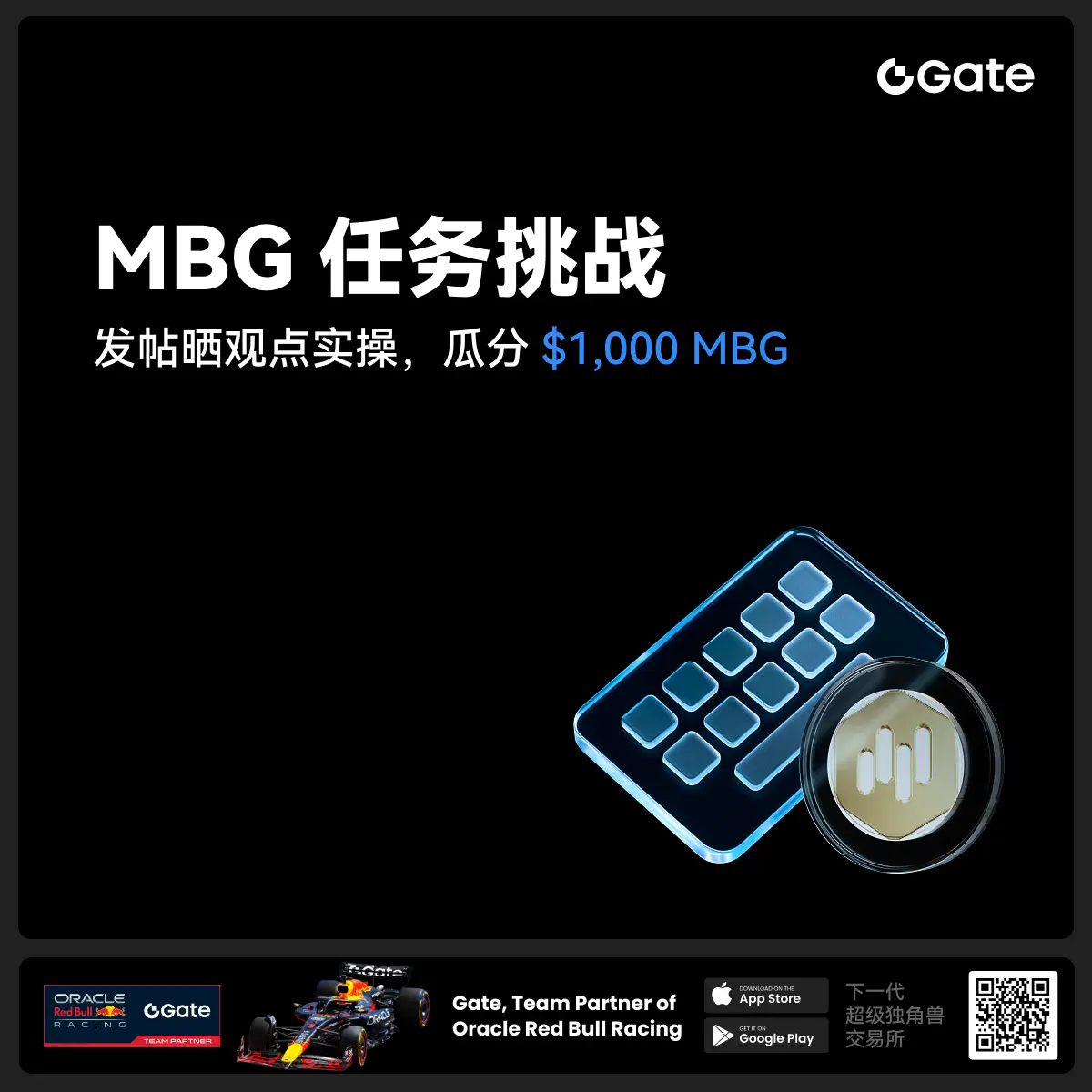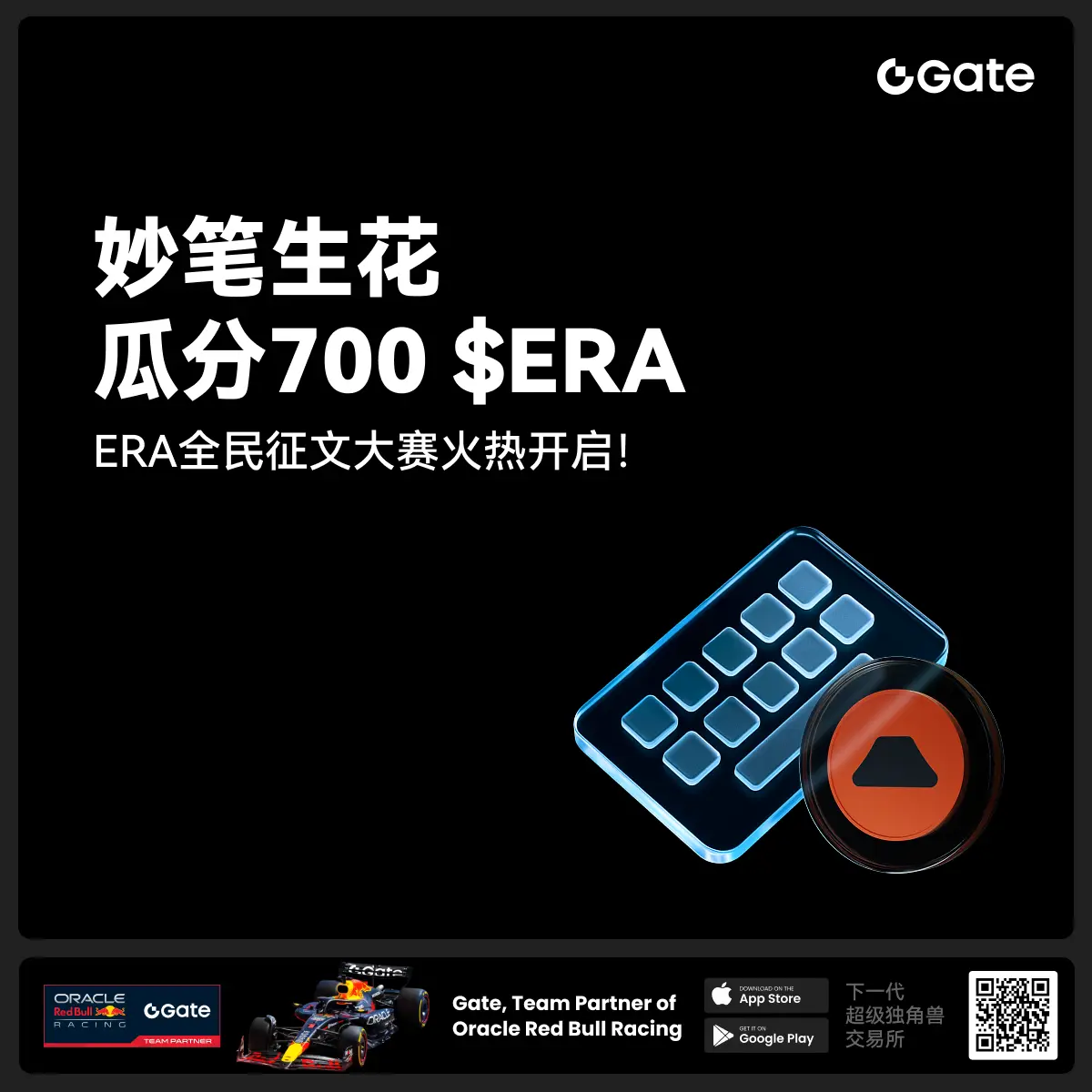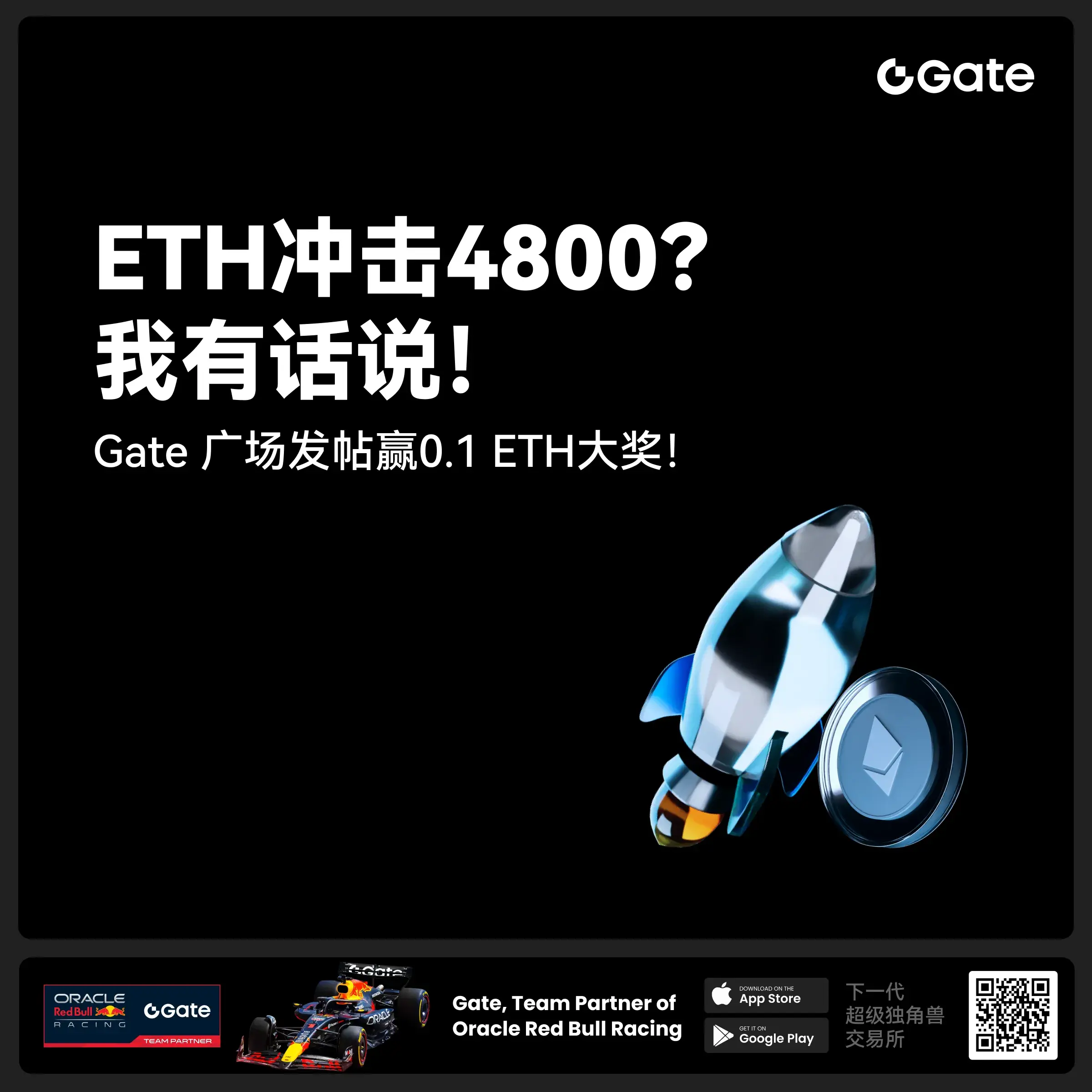- 話題1/3
42138 熱度
44957 熱度
45631 熱度
52081 熱度
21119 熱度
- 置頂
- 📢 Gate廣場 #MBG任务挑战# 發帖贏大獎活動火熱開啓!
想要瓜分1,000枚MBG?現在就來參與,展示你的洞察與實操,成爲MBG推廣達人!
💰️ 本期將評選出20位優質發帖用戶,每人可輕鬆獲得50枚MBG!
如何參與:
1️⃣ 調研MBG項目
對MBG的基本面、社區治理、發展目標、代幣經濟模型等方面進行研究,分享你對項目的深度研究。
2️⃣ 參與並分享真實體驗
參與MBG相關活動(包括CandyDrop、Launchpool或現貨交易),並曬出你的參與截圖、收益圖或實用教程。可以是收益展示、簡明易懂的新手攻略、小竅門,也可以是現貨行情點位分析,內容詳實優先。
3️⃣ 鼓勵帶新互動
如果你的帖子吸引到他人參與活動,或者有好友評論“已參與/已交易”,將大幅提升你的獲獎概率!
MBG熱門活動(帖文需附下列活動連結):
Gate第287期Launchpool:MBG — 質押ETH、MBG即可免費瓜分112,500 MBG,每小時領取獎勵!參與攻略見公告:https://www.gate.com/announcements/article/46230
Gate CandyDrop第55期:CandyDrop x MBG — 通過首次交易、交易MBG、邀請好友註冊交易即可分187,500 MBG!參與攻略見公告:https://www.gate.com/announcements
- 📢 #Gate广场征文活动第三期# 正式啓動!
🎮 本期聚焦:Yooldo Games (ESPORTS)
✍️ 分享獨特見解 + 參與互動推廣,若同步參與 Gate 第 286 期 Launchpool、CandyDrop 或 Alpha 活動,即可獲得任意獎勵資格!
💡 內容創作 + 空投參與 = 雙重加分,大獎候選人就是你!
💰總獎池:4,464 枚 $ESPORTS
🏆 一等獎(1名):964 枚
🥈 二等獎(5名):每人 400 枚
🥉 三等獎(10名):每人 150 枚
🚀 參與方式:
在 Gate廣場發布不少於 300 字的原創文章
添加標籤: #Gate广场征文活动第三期#
每篇文章需 ≥3 個互動(點讚 / 評論 / 轉發)
發布參與 Launchpool / CandyDrop / Alpha 任一活動的截圖,作爲獲獎資格憑證
同步轉發至 X(推特)可增加獲獎概率,標籤:#GateSquare 👉 https://www.gate.com/questionnaire/6907
🎯 雙倍獎勵機會:參與第 286 期 Launchpool!
質押 BTC 或 ESPORTS,瓜分 803,571 枚 $ESPORTS,每小時發放
時間:7 月 21 日 20:00 – 7 月 25 日 20:00(UTC+8)
🧠 寫作方向建議:
Yooldo
- 🎉Gate 2025 上半年社區盛典:內容達人評選投票火熱進行中 🎉
🏆 誰將成爲前十位 #Gate广场# 內容達人?
投票現已開啓,選出你的心頭好
🎁贏取 iPhone 16 Pro Max、限量週邊等好禮!
📅投票截止:8 月 15 日 10:00(UTC+8)
立即投票: https://www.gate.com/activities/community-vote
活動詳情: https://www.gate.com/announcements/article/45974
- 📢 #Gate广场征文活动第二期# 正式啓動!
分享你對 $ERA 項目的獨特觀點,推廣ERA上線活動, 700 $ERA 等你來贏!
💰 獎勵:
一等獎(1名): 100枚 $ERA
二等獎(5名): 每人 60 枚 $ERA
三等獎(10名): 每人 30 枚 $ERA
👉 參與方式:
1.在 Gate廣場發布你對 ERA 項目的獨到見解貼文
2.在貼文中添加標籤: #Gate广场征文活动第二期# ,貼文字數不低於300字
3.將你的文章或觀點同步到X,加上標籤:Gate Square 和 ERA
4.徵文內容涵蓋但不限於以下創作方向:
ERA 項目亮點:作爲區塊鏈基礎設施公司,ERA 擁有哪些核心優勢?
ERA 代幣經濟模型:如何保障代幣的長期價值及生態可持續發展?
參與並推廣 Gate x Caldera (ERA) 生態周活動。點擊查看活動詳情:https://www.gate.com/announcements/article/46169。
歡迎圍繞上述主題,或從其他獨特視角提出您的見解與建議。
⚠️ 活動要求:
原創內容,至少 300 字, 重復或抄襲內容將被淘汰。
不得使用 #Gate广场征文活动第二期# 和 #ERA# 以外的任何標籤。
每篇文章必須獲得 至少3個互動,否則無法獲得獎勵
鼓勵圖文並茂、深度分析,觀點獨到。
⏰ 活動時間:2025年7月20日 17
- 📢 ETH衝擊4800?我有話說!快來“Gate廣場”秀操作,0.1 ETH大獎等你拿!
牛市預言家,可能下一個就是你!想讓你的觀點成爲廣場熱搜、贏下ETH大獎?現在就是機會!
💰️ 廣場5位優質發帖用戶+X瀏覽量前5發帖用戶,瓜分0.1 ETH!
🎮 活動怎麼玩,0門檻瓜分ETH!
1.話題不服來辯!
帶 #ETH冲击4800# 和 #ETH# 在 廣場 或 K線ETH下 圍繞一下主題展開討論:
-ETH是否有望突破4800?
-你看好ETH的原因是什麼?
-你的ETH持倉策略是?
-ETH能否引領下一輪牛市?
2. X平台同步嗨
在X平台發帖討論,記得帶 #GateSquare# 和 #ETH冲击4800# 標籤!
把你X返連結提交以下表單以瓜分大獎:https://www.gate.com/questionnaire/6896
✨發帖要求:
-內容須原創,字數不少於100字,且帶活動指定標籤
-配圖、行情截圖、分析看法加分,圖文並茂更易精選
-禁止AI寫手和灌水刷屏,一旦發現取消獎勵資格
-觀點鮮明、邏輯清晰,越有料越好!
關注ETH風向,創造觀點價值,從廣場發帖開始!下一個牛市“預言家”,可能就是你!🦾🏆
⏰ 活動時間:2025年7月18日 16:00 - 2025年7月28日 23:59(UTC+8)
【立即發帖】 展現你的真知灼見,贏取屬於你的ETH大獎!
模組化帳戶摘要 2023 年回顧:里程碑、數據和趨勢
詞:康拉德·科普
翻譯:白話區塊鏈
2023年是「帳戶抽象創新者」的一年。 ERC-4337激發了最初的熱情,推出了一個開發者社區(4337 Mafia),但它的影響遠遠超出了標準本身。 新的錢包已經出現(例如,靈魂錢包和Clave),重要的智慧合約帳戶功能已經得到改進(會話密鑰,新的恢復機制和訪問密鑰),相關的垂直行業已經找到了利用智慧帳戶來推動其他關鍵用戶體驗基礎設施改進的方法(例如,基於意圖的交易)。
在 4337 之上看到大量創新的新興垂直領域是所有這些開發的核心,那就是模組化帳戶抽象。 模組化帳戶抽象承諾了一個智慧帳戶可以輕鬆擴展、定製、可移植和安全的世界。 我們對 2024 年這個領域發生的事情感到非常興奮。 為了拉開今年的序幕,我們想回顧一下去年的關鍵里程碑,並概述我們對 2024 年的預測。
1,2023 年之前
模組化智慧帳戶的想法已經存在了一段時間,到 2023 年,最重要的(據我們所知)模組化帳戶是 Safe。 其架構允許在帳戶內部回調執行器模組,以及保護/挂鉤模組和回退處理程式。 為Safe構建的模組的一些示例包括由GnosisDAO構建的Zodiac模組。 帳戶抽象的其他參與者之前已經探索了模組化的某些方面,例如Argent,但據我們所知,他們還沒有過渡到在生產中使用這種範式。
2、開始
2022 年底,當我們接近完成對 ERC-4337 的審計時,出現了使用 Diamond 代理的模組化 ERC-4337 帳戶的想法。 在 2023 年 2 月的 ETHDenver 會議上,Rhinestone 構建了此類帳戶的第一個原型,具有以下特點:
1) 模組化
2) 與 ERC-4337 的原生相容性
3)基於鑽石代理,被選為駭客馬拉松的決賽選手之一。
這引發了大量的討論、社區努力、原型和產品。
3. 技術里程碑/建議
ETHDenver 會議活動後採取的第一個重要步驟是推出 ERC-6900(2023 年 4 月 18 日)。 該提案的目標是規範模組化智慧帳戶,並從我們在 ETHDenver 的早期原型中汲取靈感。 這正式開啟了圍繞使用鑽石代理(尤其是委託調用)來實現智慧帳戶模組化的公開討論。 緊接著,ZeroDev 於 4 月 25 日推出了他們的內核,它仍然是最簡化和可擴展的智能帳戶。 隨後,在 9 月 27 日,B1C0nomy 推出了自己的模組化智慧帳戶,通過分叉 Safe 並允許模組化驗證邏輯,使其與 4337 原生相容。 此外,Thirdweb在夏末宣佈了動態帳戶。
但是,模組化帳戶並不是難題的唯一部分。 模組化帳戶抽象的承諾是,任何開發人員都可以構建任何智慧帳戶使用者都可以安裝和使用的智慧帳戶功能。 將第三方開發人員引入帳戶會帶來重大的安全風險。 為了解決這個特殊問題並創建一個模組分發和發現平臺,我們推出了一個模組註冊表(7 月),緊隨其後的是 ERC-7484(8 月 14 日)。 Safe{協定}的白皮書隨後於8月15日發佈,旨在解決安全生態系統中的這一確切問題。
2023 年的模組開發圍繞基本帳戶功能展開。 這包括開發新的帳戶恢復系統,例如Safe的恢復中心,改進使用直通密鑰作為簽名機制,以及改善跨多個網路的帳戶同步的多鏈模組。 除了這些基本的帳戶功能外,我們開始看到更具洞察力的模組,這些模組為使用者提供了更高的安全性、隱私性,並直接從他們的帳戶方便地訪問去中心化金融(稍後會有更多預測)。 為了向開發人員提供使用這種模組化架構輕鬆構建自定義帳戶功能所需的工具,Rhinestone 推出了 ModuleKit(8 月 25 日),這是第一個用於模組開發的開發人員框架。
11月,B1C0nomy和萊茵斯通合作宣佈了第一個“模組商店”,計劃於2024年第一季度推出。 該模組商店允許dapp和錢包開發人員發現其他人構建的模組,並將其集成到他們的應用程式中,以改善用戶體驗或創建新的產品體驗。
2023 年 12 月,ZeroDev、B1C0nomy、Rhinestone 和 OKX 合作推出了一個更簡化的模組化智慧賬戶標準:ERC-7579。 該ERC旨在實現模組開發人員和應用程式所需的最小互操作性,同時允許帳戶供應商進行創新,這受到ERC-6900的嚴重限制。
4. 相關資料
1)部署模組化帳戶
儘管模組化帳戶抽象生態系統在 2023 年才開始獲得牽引力,但絕大多數生產帳戶已經是模組化的。 內核和B1C0nomy帳戶佔4337個本機帳戶的80%以上,而Safe在智慧帳戶採用方面是市場領導者。 Kernel 已經部署了近 100 萬個帳戶,而 B1C0nomy 已經部署了超過 600,000 個帳戶(參考)。 2023 年,Safe 繼續佔據主導地位,部署了超過 410 萬個帳戶,同比增長 355%。 其中許多帳戶是代表世通幣部署的,Worldcoin今年早些時候已達到270萬個經過驗證的帳戶。
2) 利用模組化智慧帳戶應用程式
在4337生態系統中,CyberConnect和FanTV(一家去中心化媒體初創公司)是帳戶數量和使用者操作量最大的應用程式,分別擁有550,000個和470,000個唯一帳戶。 ZTX連帽衫銷售活動產生了超過200,000個帳戶,而Telegram智慧錢包Grindery創建了超過200,000個帳戶。 所有這些應用程式都利用代幣激勵來轉換使用者,這使得很難評論早期產品市場的適用性(這對用戶參與度的影響可以在下一節中看到)。 這些產品主要利用智慧帳戶來創建無縫的入職體驗,這並非模組化帳戶抽象所獨有。
模組化智慧帳戶提供更具創新性的應用程式體驗的一個領域是通過帳戶自動化實現的去中心化金融,它已成為基於意圖的交易基礎設施和產品構建者的首選平臺。 例如,Composible CoW利用Safe的模組化架構為用戶創建類似意圖的交易。 Rage Trade和CapX通過專門設計的會話密鑰提供無縫的去中心化金融操作。 然而,這些產品仍處於早期實驗階段,尚未充分利用智慧帳戶模組。
3) 使用者統計
到目前為止,ERC-4337生態系統作為一個整體的一個主要缺點是使用者的保留率非常低,如下圖所示(來自BundleBear)。 由於絕大多數 ERC-4337 帳戶都是模組化的,因此模組化帳戶抽象生態系統也是如此。 如上所述,主要原因之一可能是使用代幣激勵來推動使用者對連接產品的初始採用。
5,2024年預測
我們認為2024年的兩個關鍵詞將是採用和互操作性。
1) 收養
到 2023 年,我們看到大多數智慧帳戶通過嵌入式錢包採用,或者正如一些人建議的嵌入式簽名者。 這些簽名者控制的絕大多數智慧帳戶都是模組化的,我們相信這一趨勢將在 2024 年繼續下去。 新的嵌入式簽名者SDK的興起和對現有SDK的改進將推動開發人員繼續競爭為其開發人員提供新功能,我們相信智慧帳戶模組將在區分不同參與者方面發揮關鍵作用。
現有模組(如passSecret Key驗證器或各種恢復和會話密鑰類型)的採用將繼續增長。 開發人員還將嘗試更獨特的模組,例如去中心化金融自動執行器,這將有助於他們提供與傳統中心化金融競爭或超越傳統中心化金融的獨特產品體驗。 模組可以在鏈上引入任何給定用戶的機器人方面發揮關鍵作用,並大大降低去中心化金融採用的知識門檻。
我們還看到在安全和隱私領域採用模組。 支出限制和可配置的多重簽名(例如,如果與新合同交互,則需要額外的簽名者)提供了簡單的安全增強功能,但更高級的漏洞檢測模組可以與離線服務結合使用。 將出現利用隱私技術的模組,為使用者提供一種混淆其身份並增加其隱私的方法。 這可以確保帳戶恢復過程不會暴露用戶資訊,或者為隱蔽的點對點交互提供新的機制。
2) 互操作性
在 2023 年,我們看到許多不同的玩家在模組化帳戶抽象方面開闢了新的道路,導致了很多碎片化。 雖然我們相信創新將繼續,但我們也相信,到2024年,互操作性將發揮更大的作用,使應用程式和使用者更容易訪問模組,並使開發人員更容易將其模組分發給任何使用者,無論他們使用哪個帳戶進行實施。
我們相信互操作性可以通過三種方式實現:
1) 在帳戶合約層級
2)在帳戶建立和
3)在模組級別。
ERC-7579是第一個方面的最佳候選者,ZeroDev,B1C0nomy和OKX(目前合計佔所有符合4337標準的智慧帳戶的80%以上)計劃在第一季度採用它,並有更多的帳戶構建者跟進。 第二個方面旨在更輕鬆地在由同一 SDK 驅動的多個應用程式(可能跨多個 SDK)創建和重用嵌入式簽名者。
在 2023 年,我們已經看到了一個旨在實現這一目標的標準示例 ERC-7555,並且在 DevConnect 期間在 WalletUncon 上進行了幾次討論,致力於解決這個問題。
最後,我們認為 2024 年將是模組互操作性的重要一年,無論是在 ERC-7579 提出的高級別還是在更多特定於模組的級別,例如規範化,例如會話密鑰的工作方式。